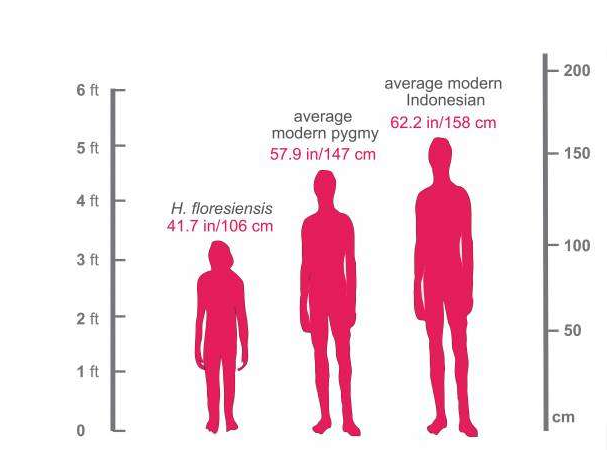On the island of Flores, Men become smaller

Living on an island is a state of mind. But according to researchers, it goes beyond that. There is indeed a phenomenon of island evolution that would play in particular on the size of animals. And as men are animals like the others ...
On the island of Cyprus, until the beginning of the Holocene, there were hippopotamuses no larger than sea lions. And on Flores Island, Indonesia, there used to be elephants the size of big pigs. A strange phenomenon of size reduction, according to scientists, to island life. A phenomenon that scientists extend today to humans.
"Flores Island is the only known example in the world where island dwarfing has appeared twice," says Joshua Akey, Population Geneticist at Princeton University (USA). His team has indeed studied the Rampasasa pygmies present on the island. As a result, no trace of archaic DNA from the famous hobbit or Man of Flores who lived there 60,000 to 100,000 years ago.

On the left, the hobbit or Man de Flores, who was barely more than the height of a four-year-old child. In the center, the modern pygmy living on the island of Flores. And on the right, a comparison with an average Indonesian. © Serena Tucci, Department of Ecology and Evolutionary Biology, Princeton University
D’autres îles concernées
Ces pygmées semblent plutôt descendre d'Asiatiques de l'Est. Leurs génomes apparaissent particulièrement riches en allèles liés à la petite taille. Les mêmes que ceux que l'on retrouve chez leurs cousins, mais à des fréquences moindres. Une découverte qui, selon les chercheurs de Princeton, suggère que sur l'île, la sélection naturelle favorise les petites tailles.
Ces résultats s'inscrivent dans la lignée d'une autre étude arrivant aux mêmes conclusions concernant les habitants des îles Andaman (océan Indien). Et ils autorisent les chercheurs à imaginer que les hobbits étaient également des hommes plus grands dont la taille a diminué après leur installation sur l'île. Peut-être parce qu'à la fois nourriture et prédateurs y sont plus rares qu'ailleurs.
Hi!
I wrote a similar article last week. I'm delighted the information is available in more than in English.
May I suggest adding the anthropology, science and/or genetics tags?